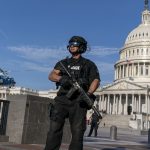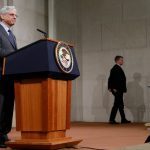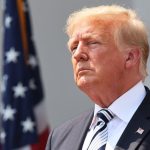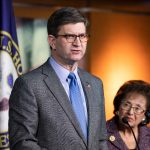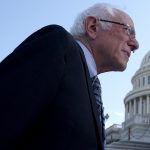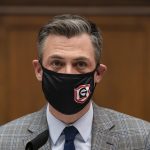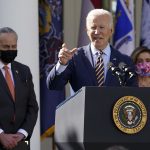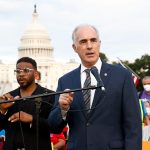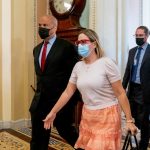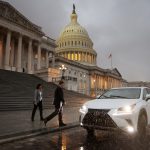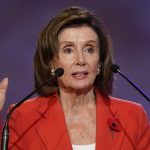Daniel Hodges, one of the police officers who testified at the first Jan. 6 select committee meeting on Tuesday, called those who breached the Capitol that day “terrorists” — rejecting GOP Rep. Andrew Clyde’s comparison of the riot to a typical “tourist visit.”
Asked how he felt about Clyde’s description of the deadly riot as a "tourist visit," Hodges said: "If that’s what American tourists are like, I can see why foreign countries don’t like American tourists.” The comment sparked some brief laughter in the committee room, mostly staff and lawmakers.
Hodges, a Metropolitan Police officer who was among scores wounded by pro-Trump insurrectionists at the Capitol, acknowledged that defenders of the rioters and allies of the former president might object to the term "terrorists." But the label was accurate, Hodges told select committee members as he read aloud the definition of domestic terrorism from federal law.
“I can see why someone would take issue with the title of terrorist. It’s gained a lot of notoriety in our vocabulary in the past few decades, and we’d like to believe that no, that couldn’t happen here. No domestic terrorism. No homegrown threats," Hodges said.
"But I came prepared," he continued, reading an excerpt of U.S. statute that defines "domestic terrorism" as "activities that involve acts dangerous to human life" that violate criminal law and "appear to be intended to intimidate or coerce a civilian population or to influence the policy of a government by intimidation or coercion." The Trump supporters who stormed the Capitol on Jan. 6 aimed to disrupt the congressional certification of Donald Trump’s Electoral College loss to President Joe Biden.
Hodges’ sentiment was echoed by Officer Aquilino Gonell, who said, “I don’t know how you would call an attack on officers a tour.” During Tuesday’s hearing, the officers detailed attacks by rioters and brutal hand-to-hand combat on Jan. 6 as responders defended the Capitol building.
Clyde, a Georgia Republican lawmaker who was caught on camera helping barricade the House chamber doors during the riot, drew sharp Democratic criticism for his comparison of the siege to a tourist visit. Speaker Nancy Pelosi called the comparison "sick" in May.
Later in the select committee hearing, Capitol Police Officer Harry Dunn compared the insurrection to an attack carried out by a hitman, implicitly pointing a finger at then-President Trump for inciting the deadly insurrection.
“If a hitman is hired and he kills somebody, the hitman goes to jail,” Dunn said. "But not only does the hitman go to jail, but the person who hired them does."
“There was an attack carried out on Jan. 6 and a hitman sent them,” Dunn continued, referring to allegations that Trump incited the Jan. 6 riot by telling his supporters to “fight like hell” at a rally earlier that day.
Dunn told lawmakers on the select panel that “I want you to get to the bottom of that."
Clyde’s specific remarks — that “if you didn’t know the TV footage was a video from January the 6th, you would actually think it was a normal tourist visit” — are part of an apparent effort by many in the Republican Party to downplay or shift blame for the Capitol insurrection. Trump himself has referred to the insurrection as a "love fest," a description the officer’s at Tuesday’s hearing rejected as they described the violent attacks they faced from rioters.
Tuesday’s hearing, the first held by the select committee on Jan. 6, took place with just two Republicans present — Reps. Liz Cheney (Wyo.) and Adam Kinzinger (Ill.), both of whom were named to the panel by Pelosi. Senate Republicans rejected legislation to establish an independent commission to investigate and author a report on the Jan. 6 insurrection, prompting Pelosi and her caucus to opt for the creation of a select committee probe.
House Minority Leader Kevin McCarthy later withdrew the lawmakers he chose for the investigation after Pelosi rejected two of his picks, Reps. Jim Jordan of Ohio and Jim Banks of Indiana.
"Liz Cheney and Adam Kinzinger are being lauded as courageous heroes. And while I agree with that notion, why? Because they told the truth? Why is telling the truth hard?" Dunn asked lawmakers on the panel as the hearing approached its conclusion.
"I guess in this America, it is," Dunn added. "Us four officers, we would do January 6th all over again. We wouldn’t stay home because we knew it was going to happen. We would show up. That’s courageous. That’s heroic. So what I ask from you all is to get to the bottom of what happened."

